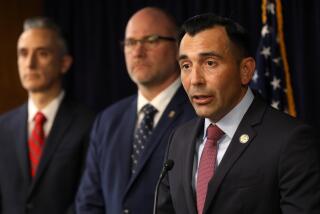Investigators Broaden Sumitomo Probe
- Share via
WASHINGTON — Investigators have widened their probe of Sumitomo Corp.’s $1.8-billion loss to encompass all firms the Japanese metals giant dealt with in the copper market, the Commodity Futures Trading Commission said Monday.
The investigation intensified amid disclosures that questions about the scandal’s central figure were raised more than five years ago by another copper trader, David L. Threlkeld. Threlkeld alleged that Sumitomo’s then-chief copper trader, Yasuo Hamanaka, had asked him to falsify trading records in 1991.
Sumitomo said in announcing the losses last week that it became aware of improper trading by Hamanaka only earlier this month.
Sumitomo said Thursday that Hamanaka falsified the company’s books and records to cover up the estimated $1.8 billion in losses over 10 years. Hamanaka, who was based in Tokyo, has been fired.
In a statement, CFTC acting Chairman John E. Tull Jr. described a sweeping review of Sumitomo’s trading and business relationships.
“In order to restore the confidence necessary for this market . . , I have directed the commission staff to examine any and all relationships, financial or otherwise, between Sumitomo and any of the business concerns whose identities have surfaced or will surface in the course of the commission’s surveillance of the copper market,” Tull said. The CFTC is the main federal regulator for commodities and futures markets.
In addition, investigators will look into French bank Credit Lyonnais’ relationship with two metal-trading firms that handled millions of dollars’ worth of business for Hamanaka, a person familiar with the inquiry said.
One of the companies under CFTC review is Global Minerals & Metals Corp. of New York, according to a source familiar with the investigation, who spoke on condition of anonymity. Global Minerals sold Sumitomo contracts to buy copper, according to Global attorney Peter Havles.
Global has denied wrongdoing and said it isn’t a target of any CFTC Sumitomo probe, Havles said, but the firm has been subpoenaed to provide information for a general CFTC investigation into unusual volatility in the copper markets.
The CFTC also is reviewing Winchester Metals Ltd., the source said. The firm is a trading arm of Winchester Commodities Group Ltd. of Winchester, England, which handled many of Sumitomo’s trades on the London Metal Exchange, where most of the world’s copper is traded.
According to records obtained by Bloomberg Business News, Credit Lyonnais Rouse, a London-based commodity derivatives unit of Credit Lyonnais, helped Winchester complete trades for Global Minerals & Metals.
At Credit Lyonnais’ New York office, a spokeswoman said she is unaware of any investigation.
In another development, two sources said the CFTC formally questioned Hamanaka in April. That interview tipped off CFTC investigators that something was wrong with Hamanaka’s copper trading, according to one of the sources, a regulator who demanded anonymity. It wasn’t until nearly two months later that Sumitomo publicly accused Hamanaka of a decade’s worth of false trades, trades that allegedly led to the largest corporate trading loss in history.
The April deposition of Hamanaka, part of a broader review of irregularities in the copper market, compelled the CFTC to work even more closely with the British Securities and Investment Board to focus on Hamanaka, the source said.
Asked about the deposition, Sumitomo spokesman John Burke said the company has been cooperating with regulators since fall in the broader investigation.
A CFTC spokesman declined to identify any company that may or may not be under investigation, but said the agency will be exploring any firm with ties to Sumitomo’s copper dealings.
In regard to the assertions made by Threlkeld, a Vermont-based copper trader, Threlkeld notified the chief executive of the London Metal Exchange in 1991 that Hamanaka sent a fax requesting that Threlkeld backdate a series of trades that never took place. In the letter, a copy of which was obtained by Associated Press, Hamanaka asks Threlkeld to document $500 million in trades on his company’s letterhead and to send the document to “Mr. Nishi” with a firm identified only as “Winchester Tokyo.”
Hamanaka wrote that the request was “for our company’s internal accounting purpose only and I guarantee that this will not cause you any trouble. . . . “ The handwritten note ends in capital letters: “Do me a favor for this.”
“I was disturbed about his pattern of trading,” Threlkeld said of Hamanaka. “I was then convinced when he sent me the request that my suspicions were correct.”
Threlkeld said the London Metal Exchange ignored his complaints.
David King, chairman of the London Metal Exchange, said Hamanaka “was not subject to the jurisdiction of the LME” and therefore the exchange could not bring an enforcement action against him. King said LME officials discussed the letter with the Securities and Investment Board, which oversees Britain’s financial markets, and with Sumitomo management.
The LME had Sumitomo release Hamanaka’s letter to the public in 1991, gaining some media attention. However, it was not known at the time that Hamanaka might have been engaging in unauthorized trading.
Threlkeld said he had one of his employees do an analysis of some of Hamanaka’s trades and concluded that they did not make sense. As a result, Threlkeld said, he confronted two employees in his London office, Charles Vincent and Ashley Levett, about the trades.
“I fired Vincent. Levett quit,” Threlkeld said. Both left to form their own firm, Winchester Commodities Group.
A telephone call placed to Winchester Asset Management, an affiliate of Winchester Commodities, was not immediately returned.
More to Read
Inside the business of entertainment
The Wide Shot brings you news, analysis and insights on everything from streaming wars to production — and what it all means for the future.
You may occasionally receive promotional content from the Los Angeles Times.









